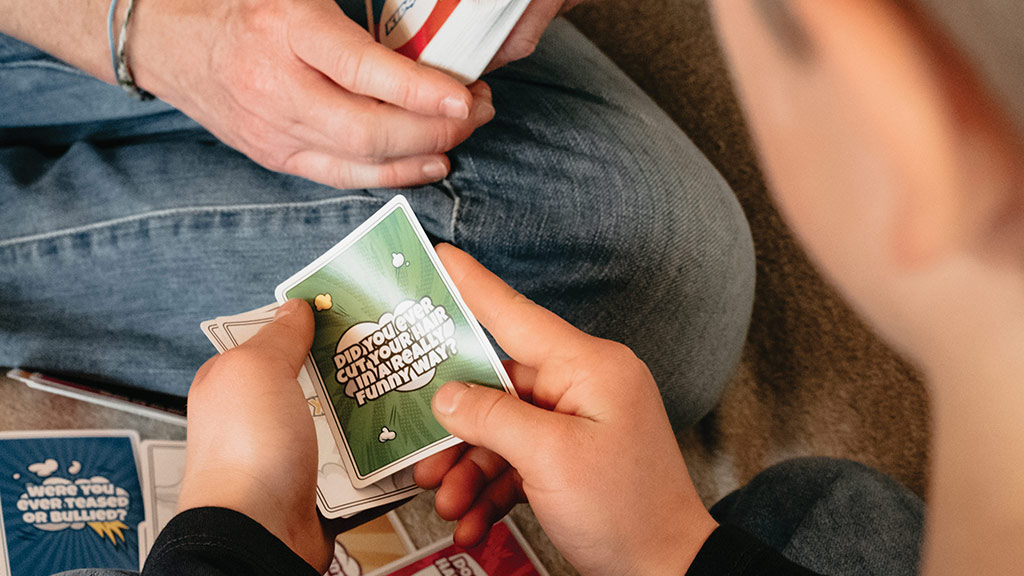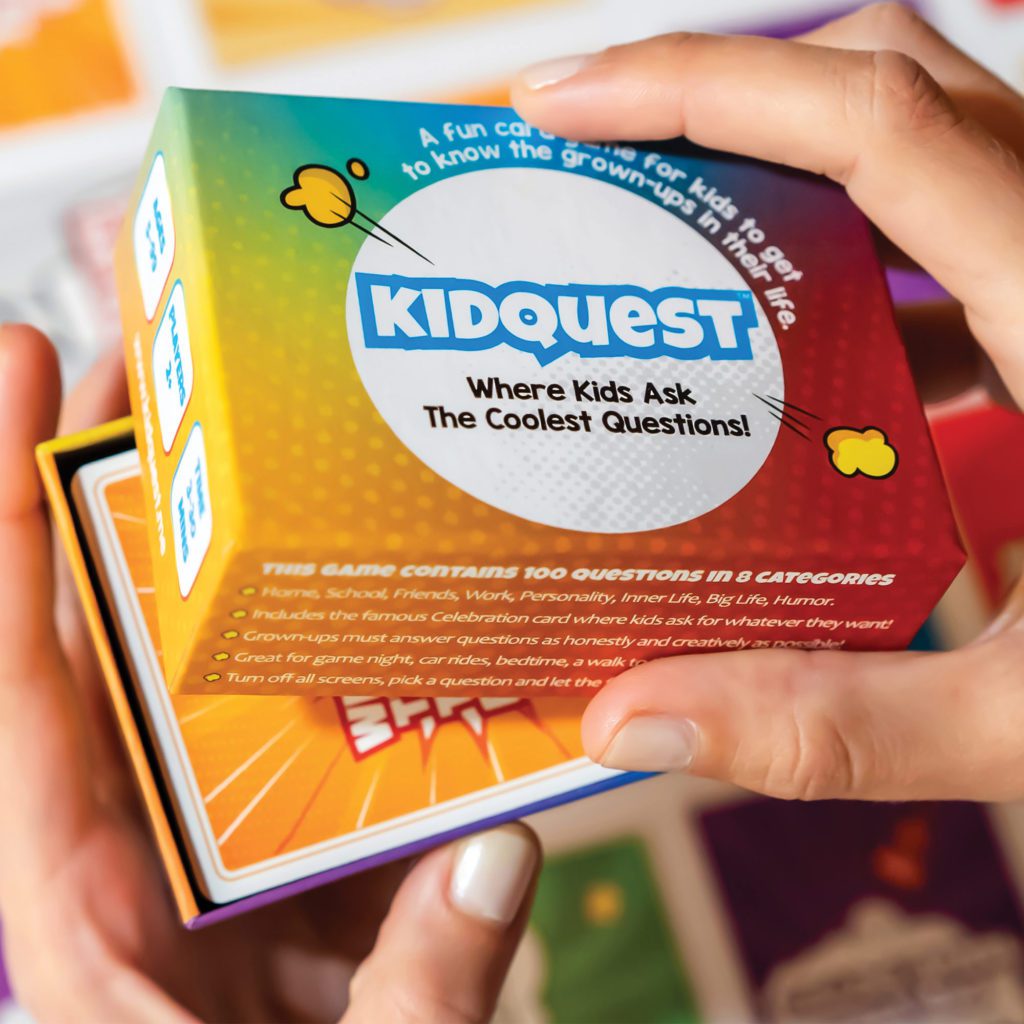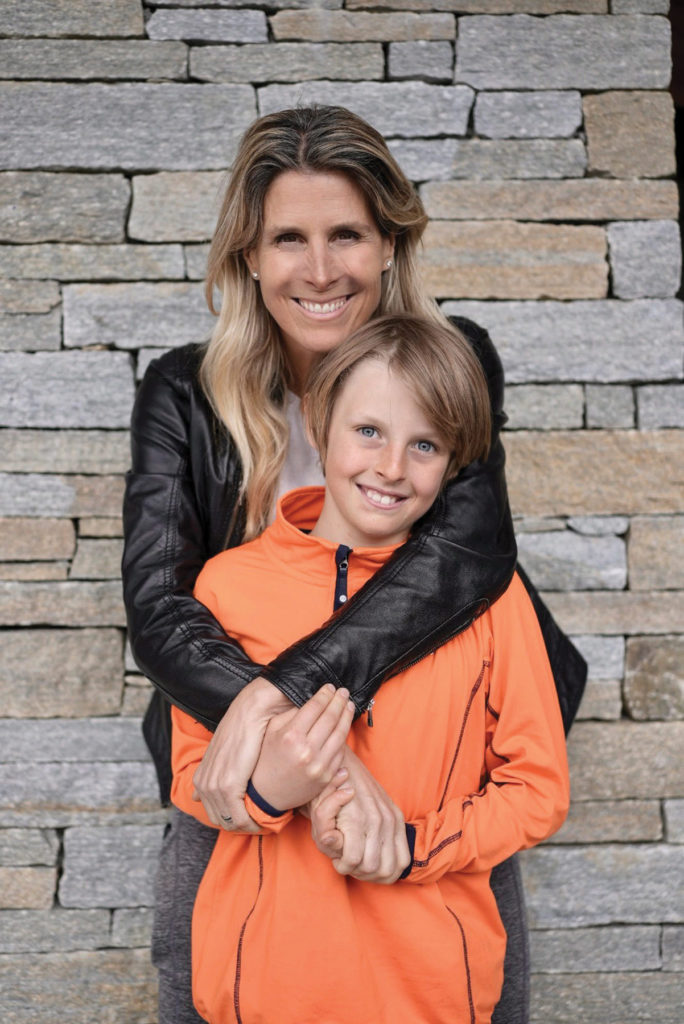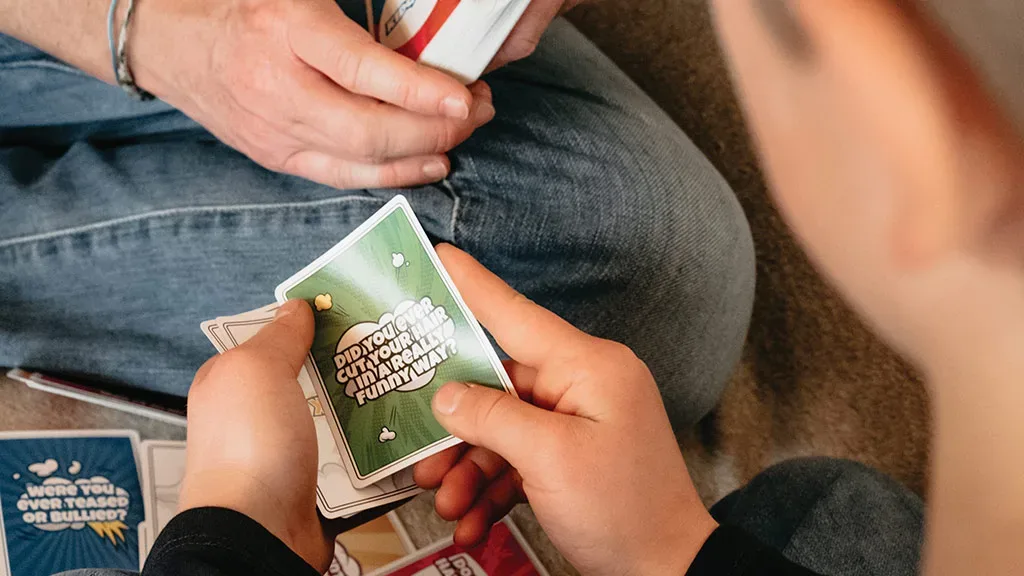
“What’s that?”
There’s no doubt that parents have heard this question from their kids before. Little ones are inquisitive, always wondering what time it is, or are we there yet? In the best cases, this hunger for information never subsides — it’s human nature to wonder about the world.
And at some point, kids begin wondering about themselves and their own families. That’s what Everest, the 8-year-old co-founder of KidQuest, found himself doing during the COVID-19 pandemic. “Always, I’d ask questions,” Everest says. His mother, Ariane de Bonvoisin, agrees: “[He’d ask] when you were a kid, did you have stitches? Because he’s had a lot of stitches.”
THE QUEST FOR SUCCESS
Creating a game seemed like an easy way to answer Everest’s many questions, and to wile away the pandemic hours. “We’ve always had the desire to create something as a family, as an entrepreneurial team,” explains de Bonvoisin, who in addition to founding KidQuest with her son, works full-time coaching start-ups. “I’ve always loved helping people create things from nothing, and I’ve always wanted us to find something as a family … we could figure out how to build [together].”
The mother-and-son team launched KidQuest, a question-asking game designed by kids, for kids. Even the name was a product of Everest’s creativity: “We chose it because one, it’s for kids and it’s with questions. So we thought, KidQuest,” he explains. “Kids go on a quest to find out who their parents, their grandparents, their teachers, and their nannies are.” The game itself is intended to allow kids to connect with their parents on a level they might not have found on their own. “The world has and is continuing to go through a tough time,” de Bonvoisin says. “[KidQuest is] a reconnection tool for families and for people who might not physically be together.”

WHAT’S IN A GAME?
In KidQuest, it’s up to the kids to ask the questions. There are eight different categories that span across different topics one might encounter in life. These categories can include personality, work life, friends, school life, and more. At each turn, the kid draws a card and asks the adult the question on the card.
But because the game was designed by a kid, there are some fun and unexpected twists. “Everest was very big on making sure [KidQuest] was a game,” says de Bonvoisin. “So he came up with extra elements to kind of gameify it.” For example, Everest added the celebration card: “It’s the best card of all,” he exclaims. When a kid draws the celebration card, they get to ask the adult for whatever they want — within reason, of course. There’s also a reverse card so that the game can change directions and adults can have a chance to ask the questions. “We thought it would be a little boring if [kids] just had questions,” Everest says.
Even the design of the game was catered to kids. The first prototype featured cards that were much too big for kid-size hands — in the actual game, the cards can be held comfortably in little ones’ paws. Originally, the game was packaged in a tin, however, Everest felt like a tin case would be easy for kids to break. Now, KidQuest comes in a cardboard box that can handle all the scrapes and bruises that kids may toss at it. “It’s just nice to have games where the kids really are running the show,” says de Bonvoisin. “It sort of changes the balance of power in some ways.”
Not only does KidQuest shift the power, but it also helps kids realize that their parents were young once, too. “I think in some ways, it normalizes the parenting relationship,” de Bonvoisin says. “Everest realized that we were also eight [once] … we also didn’t like spelling tests and didn’t like homework.” It can often be hard for kids to see their parents as anything but a governing figure making them do the things they hate. But when they realize that their parents also had to do chores or complete their homework, it can make doing the work a little easier. “It’s a bit different when you have it be your own story as opposed to just constantly telling the kid how to be and how to do things,” explains de Bonvoisin.
Everest agrees. He says that when a question comes up that asks about homework, it helps him understand that he is not alone in his experience. When his parents say they didn’t like doing homework, “that just normalizes it so I’m not like, I had homework, and they’re like, just do it,” he says. He continues by explaining that KidQuest has helped him understand who his parents and relatives were when they were younger, helping him to foster deeper relationships with those he loves.

SCREEN-FREE IS THE WAY TO BE
In the age of the internet, it can be more difficult to create those deeper bonds within a nuclear family. Because society has shifted to a more technological culture, there aren’t a lot of pillars in place to help maintain familial bonds. KidQuest aims to bridge this new gap by making families carve time out to learn about each other. “There’s not much that’s creating a family glue anymore,” de Bonvoisin posits. “Storytelling and family history creates a shared bond, a bit of glue, a bit of roots.” Ultimately, the goal is for kids to be able to use their own experiences — and their family’s experiences — to face whatever obstacles the world may send their way. “It builds resilience eventually, where [kids] are going to face this stuff and … be able to pull on some of those stories [themselves] because they happened to [their family],” de Bonvoisin says.
Although KidQuest is a relatively new company, the mother-son team is quickly finding success. “For me, it’s a really cool, new experience,” Everest says. “I’ve done the small thing where you make lemonade and cookies and go to sell it … but I’ve never done something that actually gets out.” Despite the challenges that come with creating, manufacturing, and selling his own game, Everest explains that KidQuest has been receiving lots of support — both from the toy industry and from his own classmates.
WHAT’S NEXT?
Currently, the game is only being sold in the U.S. However, Everest, his family, and his friends all live in Europe, and some have been asking why it’s not available there. “We’ve had a lot of [international] interest,” de Bonvoisin says. “We’ve had a lot of people in Europe ask, we’ve had people in Asia, we’ve had people in the Middle East. That’s sort of our next step, finding distributors internationally that can help.”
Although KidQuest aims to grow internationally in the near future, they do not have plans to expand into other games — and least, not yet.
“Lack of focus often kills businesses, especially small businesses,” de Bonvoisin says. “I really want to make sure that people understand what KidQuest is, how it works, and how to play it.”
Despite staying focused, Everest and his mom have a couple big ideas —namely, to translate the game into Spanish and perhaps start their own podcast. “We might do a podcast about KidQuest where we ask celebrities how they were,” he explains. “And you take the game and ask the Queen of England, did you ever have stitches?”
While they wait for the Queen of England’s answer, Everest and his mother are just happy to see their hard work start to reap rewards.
“That’s the wind in my sails,” de Bonvoisin says. “Some family or some kids are going to get this. It just gives me the fortitude after [Everest has] gone to sleep to go ‘OK, what do we need to do for KidQuest?’” For Everest and de Bonvoisin, it’s enough to know that they’re inspiring others to reconnect.
This article was originally published in the 2022 Innovation & STEM issue of The Toy Book. Click here to read the full issue! Want to receive The Toy Book in print? Click here for subscription options!

